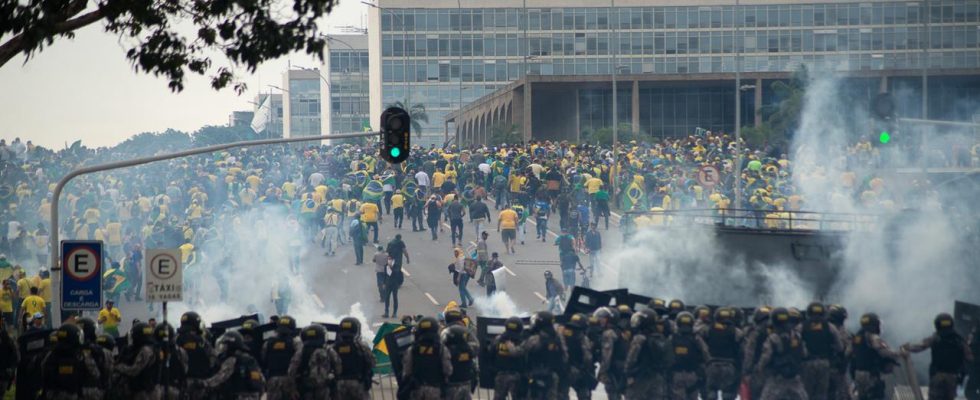A year ago, supporters of the elected President Bolsonaro stormed the Brazilian Congress. Since then, the political and legal processing of the events has made progress – but unanswered questions remain.
They broke windows, smashed furniture and works of art, urinated on carpets, beat police officers and journalists, and set fires – all while looking like football hooligans. The supporters of the elected President Jair Messias Bolsonaro had long made the yellow jersey of the Brazilian national team their identifying symbol.
Eight days after his successor Lula da Silva took office, the so-called Bolsonaristas stormed the power center in Brasilia on January 8th last year. In the following days, security forces arrested around 1,500 participants in this coup attempt, including former ministers and high-ranking government officials.
Brazil
Riots in Brasília
Attempted coup from above
Months later, a parliamentary investigative commission determined that it was actually an attempted coup and named the person primarily responsible: Bolsonaro.
“It is well known that he never had sympathy for republican and democratic principles,” said senator and rapporteur Eliziane Gama when presenting the final report in October. From the first day of his term in office, Bolsonaro attacked state institutions, “especially those that in any way stood in the way of his will to power.”
Open questions about those behind it
The political process of dealing with the “vandalism,” as incumbent President Lula da Silva called the events, was comparatively quick. This does not apply to the social background that led to this, says political scientist Guilherme Casarões, from the renowned think tank of the Getulio Vargas Foundation in Rio de Janeiro. He sees the attempted coup as the culmination of a long development. “Some equated the beginning of this development with Bolsonaro’s coming to office, others with his attempt to question the legitimacy of electronic ballot boxes.”
However, it is not yet clear which people or groups tried to undermine democracy in Brazil in the long term. Casarões refers to investigations against former Bolsonaro advisers and senior security officials. The role of some regional governments has not yet been clarified.
Christian nationalism as a driving force
The images from Brasilia were immediately reminiscent of those of the storming of the Capitol in Washington two years earlier. The worldviews of the respective actors are also similar, says Casarões: “What we call Bolsonarism is actually an association of groups that are very different, a very heterogeneous association in terms of ideology and methods of action.”
It is difficult to classify the other extremist movements active in Brazil, such as neo-Nazis or white supremacists. He himself speaks of “Christian Suprematism”. Seeing religion as a condition for belonging to the Brazilian nationality is what held the Bolsonaro movement together. January 8, 2023 is both a continuation and a climax of this development, which is trying to undermine democracy in Brazil, says Casarões, who is also involved in the observatory for right-wing extremist movements “Observatório da Extrema Direita”, founded in 2020.
The development in Brazil is closely linked to the success of former US President Donald Trump, but the people behind it also have connections to extremists in Argentina, Chile and Spain. There are also personal connections to this milieu in Germany through Sven von Storch, the husband of AfD member of the Bundestag Beatrix von Storch, says Casarões, which is “connected to this ultra-Catholic, ultra-Christian movement with right-wing extremist tendencies.”
Bolsonaro remains on the reserve bench
In Brazil this movement is still strong. But there is an important difference to the current situation in the USA: Unlike Trump, Bolsonaro cannot return anytime soon. In June, Brazil’s Supreme Electoral Court deprived him of his right to stand for election for eight years. Further proceedings against him are pending.
A year after the failed coup attempt, prison sentences of up to 17 years were imposed in 30 verdicts, and 29 further main proceedings were just opened in December. On today’s anniversary, incumbent President Lula da Silva, together with 500 invited guests from politics and society in Brasilia, wants to introduce January 8th into the political calendar as “Democracy Day”.
Pro-democracy rallies are expected across Brazil. But right-wing extremist circles are also trying to mobilize. However, government representatives expressed themselves calmly: the security authorities would monitor the networks to avoid surprises, said the State Secretary for Public Security, Tadeu Alencar.

